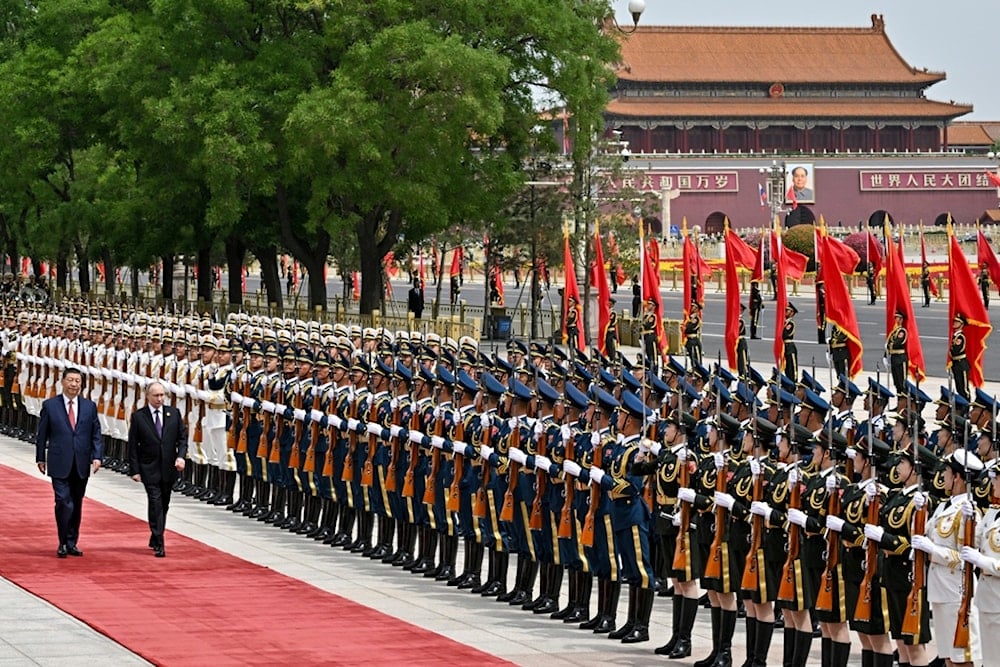Russia, China target $300Bln bilateral trade goal by 2030
Since February 2022, Beijing has become Russia's largest market for oil and gas, as well as a major source of imports.
-

Chinese President Xi Jinping, left, and Russian President Vladimir Putin review the honor guard during an official welcome ceremony in Beijing, China, Thursday, May 16, 2024. (AP)
Russia and China have agreed to achieve $300 billion in bilateral trade by 2030, a press release from the Russian Economic Development Ministry on Thursday revealed.
Russian Economic Development Minister Maxim Reshetnikov participated in various events alongside the Russian delegation during President Vladimir Putin's state visit to China.
"The minister [Reshetnikov] recalled that Russia and China currently see their key task in reaching the level of $300 billion in mutual trade by 2030. In the course of the negotiations, the governments of the two states 'compared notes' on implementing the mechanisms that will help to achieve this goal, discussed expanding strategic partnership, the general state and prospects of the further development of bilateral cooperation in different spheres," the ministry said in a statement.
Reshetnikov described trade as a "key driving force" of bilateral relations, the statement added.
"Last year, it [trade] reached a historic high of $220 billion. Russia became China's fourth main partner. This year, the trade continues to grow steadily," the minister said, adding that such numbers indicate that Russian manufacturers have done very well at redirecting their supplies and securing partnerships.
Putin is currently on a state visit to Beijing and Harbin, marking his first foreign trip post-reelection. On Thursday, extensive discussions between Putin and Chinese President Xi Jinping in Beijing covered a wide spectrum of partnership and strategic cooperation matters between Russia and China. They identified pivotal areas for furthering ties and exchanged perspectives on pertinent international and regional matters.
The itinerary of Putin's visit includes a meeting with Chinese Premier Li Qiang to deliberate on bilateral cooperation across trade, economic, and humanitarian domains. Joining the Russian president's delegation are Foreign Minister Sergey Lavrov, Defense Minister Andrei Belousov, Security Council Secretary Sergei Shoigu, Kremlin spokesman Dmitry Peskov, and other officials.
Read more: Putin open to dialogue on Ukraine, praises Chinese efforts : Xinhua
Defense-related matters have also been discussed during the meetings. The Kremlin published a statement earlier today about the development of defense cooperation between Russia and China.
"The parties are pleased to note that the consistent development of cooperation between the two states in the field of defense, based on a high level of mutual strategic trust, effectively strengthens regional and global security," said the joint statement, issued following Putin and Xi Jinping's meeting.
On the issue of chemical weapons, Russia and China expressed in their joint statement that they were deeply concerned about the politicization of the Organization for the Prohibition of Chemical Weapons (OPCW) and vowed commitment to building a world free of chemical weapons.
"The parties are committed to building a world free of chemical weapons and are deeply concerned about the politicization of the Organization for the Prohibition of Chemical Weapons," the statement said.
They also pledged deepening cooperation in combating international terrorism and extremism.
"The sides intend to deepen cooperation in the fight against international terrorism and extremism," the statement said.
US threats against China: Ineffective
Since February 2022, Beijing has become Russia's largest market for oil and gas, as well as a major source of imports.
Alarmed by this partnership, the White House in December 2023 threatened sanctions on any bank facilitating payments for Russian military equipment.
US Treasury Secretary Janet Yellen and Secretary of State Antony Blinken made separate visits to China earlier this year, issuing warnings to Chinese leaders and financial institutions.
Despite these threats, both the Russian and Chinese governments have shown remarkable resilience.
Putin's visit presents a new opportunity to discuss the creation of an alternative global financial market, the Financial Times said in a report on Tuesday.
Read more: US tariff hike on China may destabilize global economy: Jeffrey Sachs

 4 Min Read
4 Min Read










